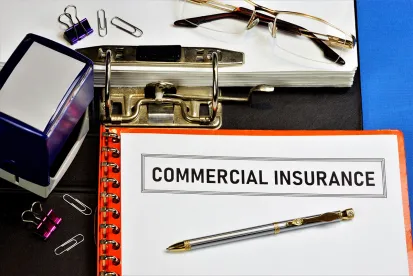Many recent government orders require “nonessential” businesses to close due to COVID-19, resulting in massive financial losses for many retail businesses. The orders also change how “essential” retailers do business. For instance, Miami-Dade County’s mayor issued an executive order requiring people who visit or work at, among other places, grocery stores, restaurants and pharmacies to use face coverings. Los Angeles County issued a similar order. These orders may result in businesses’ turning away noncompliant customers, which will cause further financial harm. Regardless of the jurisdictions where your retail business is located, it is likely that there is a governmental order affecting its operations. Your business is likely sustaining or will sustain substantial losses as a result, and incur additional expenses to comply with evolving requirements and guidelines and in resuming operations as soon as possible.
Most commercial property policies cover loss of business income and often require some type of physical loss of or damage to covered property. How the loss or damage requirement in many policies is satisfied with COVID-19 exposures will be the subject of debate. Many courts have found, and at least one insurer has conceded, that the mere presence of substances or agents on property may constitute physical loss for insurance purposes. See, e.g., Motorists Mut. Ins. Co. v. Hardinger, 131 F. App’x 823, 824-26 (3d Cir. 2005) (E. coli bacteria that caused homeowners respiratory illness and skin conditions could qualify as physical loss if the property’s function as a home was “nearly eliminated or destroyed” and the home was “useless or uninhabitable”); Gregory Packaging, Inc. v. Travelers Prop. Cas. Co. of Am., 2014 WL 6675934, at *6 (D.N.J. Nov. 25, 2014) (release of ammonia inside packaging plant constituted “direct physical loss of or damage to” property because it “physically transformed” the air into an unsafe environment); Cooper v. Travelers Indem. Co. of Illinois, 2002 WL 32775680, at *1, *5 (N.D. Cal. Nov. 4, 2002) (tavern closure due to a bacteria-contaminated water well qualified as direct physical damage to property); Widder v. La. Citizens Prop. Ins. Corp., 82 So. 3d 294, 296 (La. Ct. App. 2011) (dust from lead paint rendering a home unusable or uninhabitable qualified as a “direct physical loss”); Curtis O. Griess & Sons, Inc. v. Farm Bureau Ins. Co. of Nebraska, 528 N.W.2d 329, 331 (Neb. 1995) (insurer conceded that insured sustained physical loss when a wind-driven virus infected the insured’s swine herd).
In certain instances, coverage may be available even when the interruption is not due to physical damage to the insured’s property. That coverage can be implicated by orders from a civil authority such as a state or county that impairs or hinders access to the insured’s premises. For example, recent orders by the governor of Virginia (here) and the Los Angeles Department of Public Health (here) could trigger civil authority coverage.
Similar to civil authority coverage, attraction property coverage pays for losses incurred due to physical loss or damage to property within a certain distance from an insured location that attracts business to the insured location. This may include closure of airports, convention centers, amusement parks, hotels and other attractions that are adversely impacted by COVID-19 or related orders, resulting in loss of revenue at the insured location.
In addition, most commercial property policies provide “extra expense” coverage, which applies to necessary and reasonable costs incurred to temporarily continue business operations as normal as practicable. This may include extra costs to temporarily relocate business operations using properties or facilities of the insured or of others, as well as costs incurred to transition employees from offices to work-from-home arrangements in an effort to maintain normal business operations, among a variety of other expenses.
Aside from coverage for losses from the presence of COVID-19 at the insured’s locations, at an attraction property or to other property covered by a civil authority order, retailers may also have coverage for losses from disruptions to their supply chain. For instance, if a supplier of raw materials or finished goods is unable to provide goods due to a disruption to its operations from COVID-19, the loss of business income sustained by the retailer from that delay may be covered by contingent business interruption or dependent properties insurance.
Commercial property policies also often provide coverage for the expenses incurred by the insured in taking reasonable and necessary actions for the temporary protection and preservation of insured property due to actual or imminent physical loss or damage. This may cover the cost of prophylactically cleaning and decontaminating retail locations to prevent any patrons or employees from contracting COVID-19.
Another important issue is that although the period of indemnity generally ends when the insured’s operations return to normal, your policy might include an extended period of indemnity endorsement. That endorsement is critical because it extends the period during which your business is entitled to indemnity beyond the time it takes to recover from the loss. Essentially, the purpose of an extended period of indemnity is to protect the insured from a prolonged decline in revenue and consequential lost profits.
As described above, there are many avenues to insurance recovery for retailers and other businesses impacted by the economic downturn precipitated by COVID-19. The coverages described above are not exhaustive, but rather represent the kinds of losses and expenses most commonly implicated by COVID-19 claims. But no two policies are the same. It is critical, therefore, for retailers and all other policyholders to carefully analyze their policies in view of the particulars of their losses. Knowing the specific terms of your policy will allow you to identify the steps necessary to pursue all available coverage.






 />i
/>i

